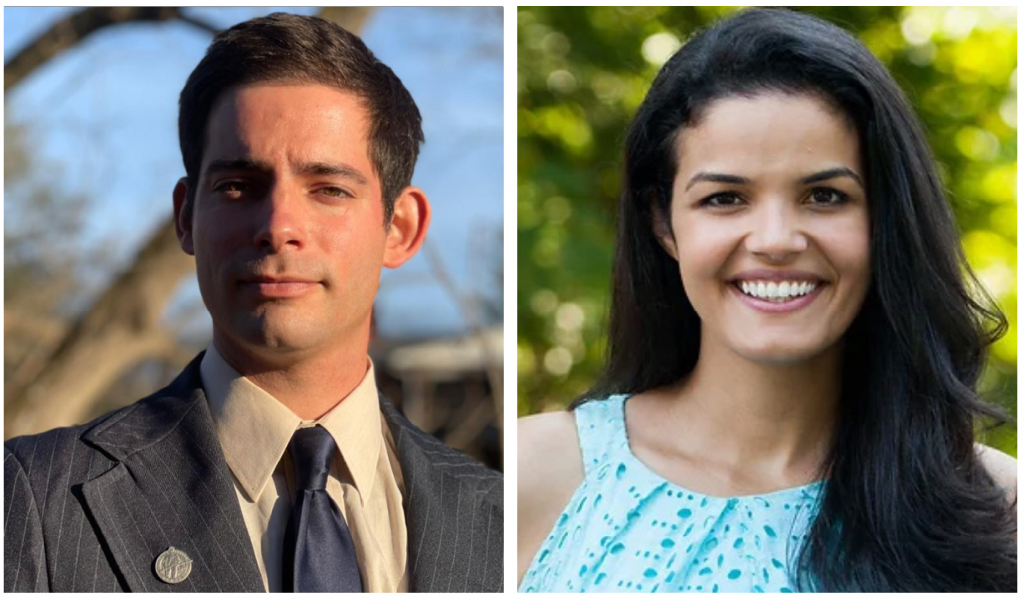In an odd way, the handsome 36-year-old at Vinny’s Italian Grill is a bit of a hero.
Philip Andrew Hamilton, a divorced legal process server who’s reasonably new to Charlottesville, got crushed by Sally Hudson two years ago in a delegate race. Now, in the local state Senate “race,” the Republican is challenging central Virginia’s best-known Democrat, Creigh Deeds, who beat Hudson in June’s Democratic primary.
“Race” is in quotes because if American gamblers set odds on political races, as in the U.K., a Hamilton victory in November would fall in the long, longshot category.
With little support from the Virginia GOP, no campaign staff, and a summer bank account that’s less than a 20th of Deeds’, he is facing a 2023 drubbing in the 11th state Senate District, which Virginia Public Access Project already rates as “strong Democrat.”
“There’s always a possibility of winning against an incumbent,” Hamilton says at the end of an hour-long conversation about issues that motivate him. “Of course, I’m an underdog but it’ll definitely send shock waves across the state if it happens.
“If I lose, I’m not going to disengage. I’m 36 and I have, hopefully, a bright future ahead of me,” he continues. “If I am to lose, and Steve Harvey [a Republican running against Amy Laufer in a local, but more competitive, House of Delegates race] also loses, I’ll run for the 55th District next time.”
“It takes courage, absolutely, but win or lose, I’m glad I’m doing this.”
And so am I. And probably many other Virginians who are aware that uncontested races, especially at the top of the ticket as this Deeds-Hamilton contest is, underline the age-old issue of whether anyone’s vote actually counts and, therefore, produce long-term repercussions by decreasing community participation in the basics of democracy.
Today, when 38 states allow victors to be declared before the first ballot is cast and about two-thirds of most names in down-ballot elections are unopposed, it’s reasonable to ask: Why show up to vote at all?
In the 2022 election, 24 Republican congressional candidates ran unopposed across the United States, a factor in today’s tiny GOP congressional margin, while nationwide, according to Ballot Ready, 91 percent of district attorney contests and 85 percent of judge positions went to unopposed candidates.
In Virginia’s off-cycle 2023 legislative elections, locally both Democrat newcomer Katrina Callsen and Republican Tom Garrett—who was all but driven from Congress for threatening his staff and is undergoing a bitter divorce with accusations of abuse—are running unopposed for the House of Delegates.

Indeed, almost one-third of Virginia delegate seats are uncontested in November, the first election after redrawing all legislative districts to make them fairer. In addition, according to a Charlottesville Tomorrow spreadsheet, there are dozens of down-ballot, uncontested races across central Virginia.
Survey and Ballots Systems notes that uncontested and noncompetitive races have four primary long-term effects: one, it causes people to curtail voting; two, citizens feel inadequately represented; three, the officials themselves feel disengaged; and four, uncontested elections lead to poor governance.
One academic study of legislative actions, published a decade ago, discovered that uncontested candidates turn up less for roll-call votes and introduce or sponsor an average 10 percent fewer bills than those who survive contested races. Uncontested winners also, the study indicated, know and do less in the “sausage making” of committee work and team building. Cross-aisle dialogue especially declines, leading to more polarization and extremism in political life.
“Collectively,” the study concluded, “our results indicate that state legislators lacking serious political competition are less active in lawmaking.”
More recent work by UVA’s Batten School of Leadership, but focused on the U.S. Congress, underlines the point. Only one of the 10 most effective Republican congressmen in its Legislative Effectiveness Score came from a safely GOP district, and half of the effectives won by five points or less—two overcoming their Democrat opposition in squeakers.
“The data that we have for Congress shows that members from uncontested districts in their most recent election tend to dedicate less effort to lawmaking, and are about 10 to 15 percent less effective overall,” says Craig Volden, the Center for Effective Lawmaking’s director. “One of the values in running someone against them is that it helps the winner be more focused.
“Noncompetitive elections affect everything, including how winners behave once in the legislature, and it masks what voters are desiring versus what legislators are not giving them.”
Research from political analysts across the nation indicates that noncompetitive election winners are also less likely to meet as many actual voters, rarely reach across the aisle for co-sponsors of their desired bills, and are more prone to listen to their party’s extremists.
In Idaho, where only four House districts are competitive and GOP legislators outnumber Democrats by a five-to-one margin, battles between MAGA Republicans and traditional, small-government Republicans have led to censures, “no confidence” votes, and have caused the state’s GOP to teeter on splitting.
“I didn’t leave the party,” one Republican legislator told The Idaho Statesman. “The party may have left me when they started putting in these extreme policies.”
In Tennessee, where the Republican supermajority and gerrymandering are so entrenched that none of the state’s 33 senate districts are rated as competitive, even Republican politicians are worried that uncontested elections—over half in The Volunteer State—lead to policies that most Tennesseans eventually reject.
“Honestly, I think I was a better state representative because my district was almost a 50-50 district,” former GOP House Speaker Beth Harwell told The Washington Post recently. “That made me more responsive, and I certainly listened to the other side more than I would have otherwise.”
In an August special session, gun-rights’ Republican legislators in Tennessee turned back weapon control measures sought by conservative Christian mothers whose children suffered in March’s Covenant private school shooting, in spite of a Vanderbilt University poll indicating 82 percent of Tennesseans want stronger background checks on gun purchases and 72 percent desire red-flag laws.
Today, half of American states have veto-proof legislative supermajorities that promote, anecdotal evidence indicates, not only more uncontested elections and less effective legislators but also more extremism and polarization.
Carah Ong Whaley, UVA’s Center for Politics’ civic engagement coordinator, who while working at James Madison University is credited with a 2020 program prompting 75 percent of JMU students to vote, notes that while a half dozen factors contribute to uncontested elections, for her the key bottom line is citizens rarely show up when there is no contest.
Turnout in Indiana and Kentucky dropped 12 percent when mayoral elections were uncontested, according to a 2018 study from Rice University’s Center for Local Elections.
“We could be on the downhill slide for democracy,” Whaley says. “Free, fair, and competitive elections should be the cornerstone, but, it seems, we are building the lack of competition right into the structure.”
“When a race is uncontested, you [candidates and parties] don’t have to educate voters so you don’t have to cultivate, or inform, the electorate; don’t have to present policy ideas. Plus, uncontested elections increase thoughts of ‘My vote doesn’t matter. I don’t need to turn out because I know my party is going to win,’ or ‘I’m not turning out because my party can’t win.’”
“If we want representative democracy to work, people need to know that they’re represented.”
For that reason, Katrina Callsen, the Democrats’ uncontested 54th District delegate candidate, isn’t taking her seat for granted.
“I’m still trying to make sure I’m getting out and communicating with people who didn’t vote,” she says across an insightful hour at C’ville Coffee. “It’s funny, the trajectory of the campaign, in that I’ve returned to the start [before she outpolled Dave Norris and Bellamy Brown in the Democratic primary], to meeting people and then always asking people who are two other people I should meet.”
The deputy Charlottesville city attorney and former Albemarle County School Board chair spent August contacting local leaders—including Republican Rob Bell—for tips on finding a solid legislative assistant and how to be a successful legislator. In September, she plans to restart her weekly C’ville Coffee listening hours, open to all, including, she hopes, Republicans. In October, she will again begin canvassing what is now “her” district, saying she’s determined not to lose focus on the issues.
One of those, she promises, is urging others to sign their names on the dotted line.
“Running for any seat is hard,” Callsen says, “and running for a seat where you don’t have a chance, it’s almost like a public service.”
I don’t agree with many of the concerns that motivate Philip Hamilton, especially his blaming the Appomattox School District for a transgender student getting sexually trafficked twice, but I’m glad he’s running for Virginia’s 11th District state Senate seat.
Too many of we the people can’t find even the time to submit an absentee ballot, yet Hamilton, who shuttles all over central Virginia to deliver subpoenas, putting miles and miles on his Ford, is sticking his neck out for another likely execution.
“What does a challenger gain in entering a race when they know they’re going to lose?” The Center for Effective Lawmaking’s Volden asks. “It does take a special person to say, ‘I know it’s a lost cause but I’m still going to fight it.’”
Editor’s note: The original version of this story described Katrina Callsen as running in the 55th District. Callsen is running in the 54th. The story has been updated to reflect this change.
